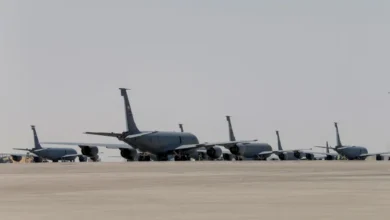
Mohamed Elmaki Ahmed:
Sudan’s military leaders seeking impossible legitimacy
القادة العسكريون السودانيون يسعون الى شرعية مستحيلة
As the unfolding war in Sudan entered its second year on 15 April 2024, the cruel consequences have been spreading from Khartoum the capital into the country, including Darfur, Kordofan, Al-Gazera, and other states .
10,000 – 15,000 were killed, according to independent international experts.
The UN confirmed on April 2024 that ‘’One year of brutal war in Sudan has led to unimaginable suffering and a devastating humanitarian crisis’’.
It added that as a ‘’result of the fighting, Sudan and its neighbours are experiencing one of the largest and most challenging humanitarian and displacement crises in the world’’
The UNHCR (The UN Refugee Agency ) said ‘’The number of Sudanese forced to flee has now surpassed 8.6 million people, with 1.8 million of them having crossed borders to other countries’’.
The UN’s world food Programme warned that famine in Sudan is a distinct possibility in the coming months’’.
Under the current shortage of food, medicine, water, and electricity famine might be one of the disastrous consequences of an all-out war.
The suffering includes the pressure of dictatorship on citizens, political parties, professional unions, and journalists.
In an atmosphere of repression, as a result of a military coup in 2021 and war in 2023, the Sudanese are living not only in a dire humanitarian situation but suffering harshly from insecurity, and instability.
There is a strong link between the destructive war and the massive damage from the military coup guided by the leader of the Sudanese Army, General Abdel Fattah Al-Burhan, and the leader of the Rapid Support Forces, General Mohamed Hamdan Dagalo, on 25th October 2021.
The two leaders were involved in a military coup when they had close relations.
Al-Burhan was the president of the Transitional Sovereign Council, and Dagalo was his deputy before war broke out.
Nevertheless, the war was a result of military and political competition and conflict between them, but other military leaders, including some leaders of armed movements and tribesmen, were engaged in the conspiracy, especially leaders and members of the radical wing of the Islamic Movement, who are keen to restore their rule after being overthrown by a historic peaceful civilian revolution in 2019, after 30 years of autocratic dictatorship.
Al-Burhan-Dagalo’s military coup ended the transitional civilian government. But two years later, Dagalo announced the coup was a “mistake” and apologized to the Sudanese people.
Al-Burhan, the leader of the army has so far refused to admit the crime of the coup, and his responsibility to avoid war.
The military leaders’ priority is to seize power and seek legitimacy, regionally and internationally, and to avoid punishment.
But legitimacy and impunity for the military leaders, hardliners and racists, who committed the crimes of a military coup and war in Sudan is like a wishful fiction.
It is not only far from being easy , in fact, it is impossible because the Sudanese people have a bright history against military dictators. They created three successful peaceful civilian revolutions in 1964, 1985, and 2019.
The clear message here means military forces must withdraw from playing political roles, to return to their barracks. The future is for, peace, justice and freedom.
The priority now is to stop war immediately and unconditionally, in theJeddah platform, which is supported by three important facilitators: the USA, Saudi Arabia, and the African Union.
This platform is a one-time opportunity for the Sudanese future, the stability of the region, and the world.
If the war’s leaders miss this opportunity, international intervention through the UN is expected, with international prosecutions.



